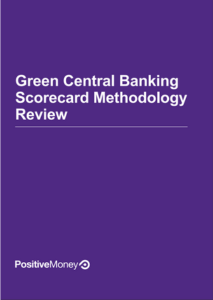Green Central Banking Scorecard Methodology Review
Published January 2024
The Green Central Banking Scorecard reviews the full range of policies and initiatives that an ideal green central bank would adopt, and ranks G20 central banks against this standard by assessing the green policies and initiatives of their monetary and prudential authorities.
Published January 2024
The Green Central Banking Scorecard reviews the full range of policies and initiatives that an ideal green central bank would adopt, and ranks G20 central banks against this standard by assessing the green policies and initiatives of their monetary and prudential authorities. Positive Money has conducted a review of the scorecard’s methodology, detailed in this report. The third edition of the scorecard will draw on the review’s findings to make improvements to the methodology, reflecting the recommendations of the stakeholders and experts who contributed to the review.
PDF DOWNLOADS:
Download full report here
(Free, PDF, 18 pages)
The 2021 and 2022 editions of the Green Central Banking scorecard show many G20 central banks and financial supervisors are making progress towards incorporating environmental considerations and objectives into their policymaking. However, this progress has not been fast enough, and some central banks are still lagging behind. For each country to do its part in tackling climate and ecological crises, more and faster progress will be needed.
The methodology of the scorecard project was initially founded on reviews of green central banking literature, expert consultation, and bilateral interactions with central bankers and supervisors. A comprehensive review of the methodology of the scorecard, informed by interviews with a range of stakeholders and experts, has been undertaken to ensure the scorecard aligns with evolving sustainability standards. Refining the methodology of the scorecard ahead of the third edition will help build a more robust and persuasive case for all central banks and supervisors to redouble their efforts towards greening their policies and activities.
The review found that the scorecard’s ability to build understanding and incentivise action is a core strength of the existing methodology, and the overall structure of the scorecard is decidedly fit for purpose. The scorecard project has helped amplify the political pressure for green central banking practices internationally, inspiring a ‘race to the top’ among the central banks and financial supervisors for G20 countries. Its flexible scoring system allows institutions to take different paths towards scoring maximum points, keeping the scorecard relevant across the differing contexts institutions operate in between countries. The review has concluded that the overall structure of the scorecard should be retained in the third edition.
However, there are some areas for potential improvement. The review found that increased granularity for the scoring system would be beneficial, as would broader contextualisation of the scores within country-specific jurisdictions. Specific recommendations include recalibrating the ‘Research and Advocacy’ scoring category, further emphasising the tangible actions central banks should take, and maximising the transparency of the scoring process. The scorecard project could also give greater consideration to institutions’ ecological impacts, clarify the requirements for credible net-zero transition plans, more strongly emphasise the phase-out of coal, and more actively direct central banks towards sustainable policies and practices.
Finally, the scorecard’s analysis must appropriately discern between historically responsible and less responsible countries when framing the results of the policy scoring process. The greater weight of responsibility for greening central banking lies with the institutions of countries that have caused the most climate and ecological harm, and have benefitted the most from unsustainable economic activity. As a result, framing the rankings of different countries within this wider historical context will be a priority of the third edition of the scorecard.
PDF DOWNLOADS:
Download full report here
(Free, PDF, 18 pages)
